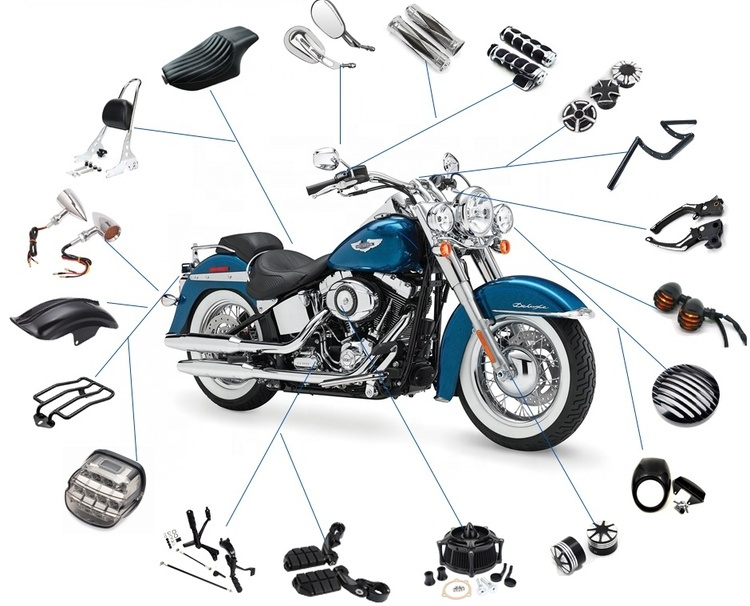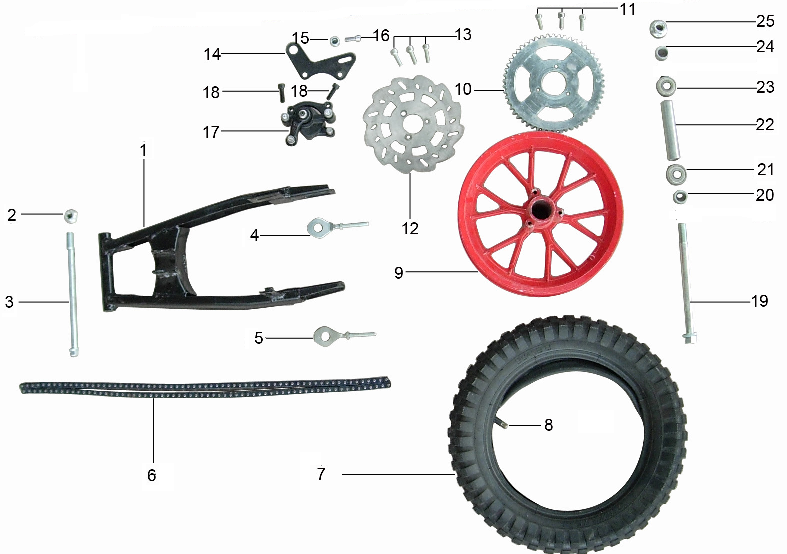Why Riders Trust Only Dealer-Certified OEM Parts New Zealand for Long-Term Value
Why Riders Trust Only Dealer-Certified OEM Parts New Zealand for Long-Term Value
Blog Article
Discover the Important Motorcycle Parts You Need for Optimum Performance
Understanding the crucial parts of a motorbike is fundamental for accomplishing peak performance. Each element, from the engine to the stopping system, plays a vital role in overall performance and safety and security. Routine maintenance can protect against unexpected failures and boost the riding experience. Nevertheless, several riders neglect the intricacies of these systems. Uncovering exactly how they function with each other can lead to a more reliable adventure. What crucial parts should every rider focus on?
The Engine: The Heart of Your Motorbike
The engine offers as the core component of a motorbike, driving its performance and defining its abilities. It is in charge of transforming gas right into mechanical power, which powers the bike onward. Numerous sorts of engines are utilized, including single-cylinder, V-twin, and inline setups, each offering unique features matched for various riding purposes and styles. The engine size, typically determined in cubic centimeters (cc), considerably influences performance, with larger engines usually providing even more power and torque.Furthermore, the engine's layout and technology, such as gas shot systems or air-cooling versus liquid-cooling, impact performance and dependability. Maintenance is important for peak operation; factors like regular oil modifications and checking trigger plugs guarantee durability. Bikers frequently consider an engine's responsiveness and smoothness, as these attributes boost the general riding experience. Ultimately, the engine stays an important element that specifies not only the motorcycle's efficiency but additionally the biker's connection to the machine.
The Transmission: Changing Gears Efficiently
The transmission plays a vital role in a motorcycle's performance, particularly in the technicians of equipment moving. Recognizing exactly how to change equipments efficiently can enhance the total riding experience, while routine upkeep warranties peak capability. Appropriate focus to these facets can substantially impact the long life and efficiency of the bike.

Gear Shifting Mechanics
Smooth gear moving is important for suitable motorcycle performance, greatly influencing both velocity and control. The auto mechanics of equipment moving include the interaction in between the clutch, equipment lever, and transmission system. When a cyclist involves the clutch, it disengages the engine from the transmission, permitting an equipment adjustment without damaging the parts. A well-timed launch of the clutch, incorporated with accurate motion of the equipment lever, assists in a smooth change between equipments. This procedure assures that the engine runs within its best power band, boosting performance. Motorcycle Spares Christchurch. In addition, understanding the gear ratios and their effect on speed and torque can help bikers make notified choices during changes, inevitably adding to an extra responsive and enjoyable riding experience
Maintenance Tips Significance
Routine maintenance plays an essential role in guaranteeing that the transmission system runs successfully, enabling smooth gear changes. Routinely inspecting and altering the transmission liquid is essential, as old liquid can cause enhanced rubbing and wear. Furthermore, checking the clutch for wear warranties peak involvement and disengagement, protecting against slippage throughout gear changes. Lubrication of relocating components is just as crucial to reduce rubbing and improve efficiency. Motorbike owners should likewise keep an eye on for leaks and uncommon noises, as these can indicate underlying concerns. By adhering to these upkeep tips, motorcyclists can extend the life-span of their transmission system, guaranteeing that gear changes stay seamless and adding to the general efficiency of their motorbike.
The Braking System: Ensuring Safety on Every Adventure
Braking systems are essential parts that straight influence a motorcycle's safety and performance. They include numerous components, consisting of brake pads, blades, calipers, and hydraulic lines, all working with each other to assure effective slowdown. The sort of braking system-- generally either disc or drum-- affects responsiveness and stopping power.Regular maintenance is vital to maintain peak performance; worn brake pads can lead to reduced performance and increased stopping ranges. Additionally, the quality of brake fluid must be kept track of, as it can absorb dampness gradually, jeopardizing braking efficiency.Riders need to also take into consideration the significance of anti-lock braking systems (ABDOMINAL MUSCLE), which avoid wheel lockup throughout abrupt quits, boosting general safety. Appropriately operating brakes are not nearly quiting; they instill confidence in the rider, permitting much safer navigation through various terrains. Eventually, a reliable stopping system is critical for delighting in every experience with comfort.
The Suspension: Enhancing Convenience and Control
A well-functioning suspension system greatly contributes to a motorcycle's total efficiency, enhancing the performance of the stopping system. The suspension plays a considerable duty in soaking up shocks from unequal surfaces, guaranteeing a smoother ride while preserving tire contact with the road. This call is crucial for both stability and control, enabling riders to browse corners with confidence and precision.Different sorts of suspension systems, such as telescopic forks or mono-shocks, supply varying levels of comfort and handling. Appropriately tuned suspension improves responsiveness, supplying the cyclist with an extra linked feeling to the motorcycle. Routine upkeep checks are essential to identify the suspension components, including dampers and springs, are operating at their finest. An efficient suspension system not only elevates the riding experience yet additionally contributes to the longevity of various other motorbike parts by reducing damage. As an outcome, purchasing quality suspension is essential for any serious motorcycle enthusiast.
The Tires: Connecting You to the Road
Tires play a crucial function in a motorcycle's efficiency, acting as the main web link in between the cyclist and the road. Understanding the various sorts of tires offered helpful resources can considerably affect taking care of and security. In addition, routine upkeep is vital to ensure peak tire efficiency and longevity.
Tire Enters Explained
Just how do different tire kinds influence a motorcycle's efficiency? Tire kinds play a vital role in site web figuring out a motorcycle's handling, grasp, and security. Sporting activity tires, designed for high performance, offer improved grip and responsiveness on smooth roads, making them optimal for competing and aggressive riding. On the other hand, touring tires prioritize sturdiness and comfort, providing a smoother ride for long-distance traveling. Off-road tires, identified by their sturdy walk patterns, master grip on unpaved surfaces, suitable for experience enthusiasts. Furthermore, dual-sport tires mix qualities from both on-road and off-road groups, satisfying functional riding demands. Ultimately, selecting the best tire type is essential for enhancing performance, making certain security, and enhancing the general riding experience.
Upkeep Tips Offered
While riding when driving, keeping perfect tire problem is vital for security and efficiency. Consistently checking tire stress is very important, as under-inflated tires can lead to bad handling and increased wear. It is advisable to inspect tread depth regularly; worn tires compromise grip and security. On top of that, motorcyclists ought to seek indications of damages, such as bulges or cracks, which can indicate the need for replacement. Rotating tires periodically assures even put on, enhancing long life. Furthermore, keeping tires tidy from particles and staying clear of too much aesthetics can lengthen their life expectancy. Maintaining appropriate alignment and equilibrium adds to come to a head efficiency, minimizing anxiety on various other bike elements. Sticking to these maintenance ideas will substantially boost the overall riding experience.
The Gas System: Fueling Efficiency and Effectiveness
The fuel system plays a vital duty in making best use of a motorcycle's efficiency and performance, as it guarantees the ideal distribution of gas to the engine. It makes up numerous vital elements, consisting of the gas tank, fuel pump, fuel filter, and gas injectors or carburetor. Each component must operate successfully to ensure a smooth and powerful ride.The gas storage tank stores gasoline and supplies it to the engine through the gas pump, which generates the required pressure. A gas filter protects against contaminants from going into the engine, while the injectors or carburetor mix fuel with air for combustion.Proper upkeep of the fuel system is essential; a clogged filter or malfunctioning injector can lead to decreased efficiency and enhanced fuel usage. By validating that the gas system runs efficiently, bikers can enjoy better throttle response, far better fuel economy, and on the whole boosted riding experience.
The Electric System: Powering Your Experience
An efficient electrical system is important for the general capability and safety of a motorbike, as it powers crucial parts such as the ignition, illumination, and various electronic systems. This system includes the battery, which stores power, and the generator, accountable for generating power while the engine runs. The circuitry harness connects these parts, guaranteeing reliable power distribution.Additionally, fuses protect the system from overloads, while relays help manage high-current tools with low-power signals. A well-maintained electrical system improves performance by guaranteeing smooth beginnings and consistent operation of lights and signals, important for motorcyclist exposure and safety.Regular checks of the battery's fee and connections are very important for preventing electrical failings. Bikers need to likewise evaluate click site wiring for deterioration, guaranteeing all elements function ideally. Eventually, a durable electric system adds significantly to the overall performance and reliability of the motorbike.
Frequently Asked Concerns
Exactly how Typically Should I Change My Bike's Battery?
The frequency of bike battery replacement relies on use and maintenance (Motorbike Components NZ). Normally, batteries should be changed every 3 to five years. Normal checks can assist identify when a substitute is needed for peak performance
What Tools Do I Need for Standard Motorcycle Upkeep?
For fundamental motorbike upkeep, one requires important devices such as a socket collection, wrenches, screwdrivers, pliers, tire stress gauge, and a torque wrench. These tools promote reliable upkeep and guarantee the motorbike runs successfully and safely.
Just How Can I Improve My Motorbike's The rules of aerodynamics?
To enhance motorbike aerodynamics, one ought to think about adjusting fairings, making use of windshield extensions, enhancing body setting, and reducing overall weight. These modifications help minimize drag, enhancing stability and gas performance throughout rides.
What Are the Indicators of a Failing Electrical System?
Signs of a failing electrical system include lowering lights, problem starting, uneven instrument analyses, and blown fuses. Bike Parts Wellington. Unusual smells or deterioration around battery terminals might additionally suggest underlying concerns requiring prompt focus for safety and efficiency

Just how Do I Choose the Right Oil for My Bike?
When choosing oil for a motorbike, one must consider the producer's specifications, thickness rankings, and the kind of riding. Furthermore, conventional versus artificial oil can impact performance and engine defense, affecting the choice substantially. The engine dimension, generally measured in cubic centimeters (cc), considerably affects performance, with bigger engines usually offering more power and torque.Furthermore, the engine's design and innovation, such as fuel injection systems or air-cooling versus liquid-cooling, influence efficiency and reliability. A well-functioning suspension system substantially contributes to a motorcycle's general performance, complementing the performance of the braking system. The fuel system plays a vital function in making best use of a motorcycle's performance and efficiency, as it guarantees the optimum shipment of fuel to the engine. A fuel filter stops contaminants from getting in the engine, while the injectors or carburetor mix fuel with air for combustion.Proper upkeep of the gas system is crucial; a stopped up filter or malfunctioning injector can lead to lowered performance and increased gas usage. A well-maintained electrical system boosts efficiency by making sure smooth starts and regular operation of lights and signals, essential for cyclist presence and safety.Regular checks of the battery's fee and connections are vital for protecting against electric failings.
Report this page